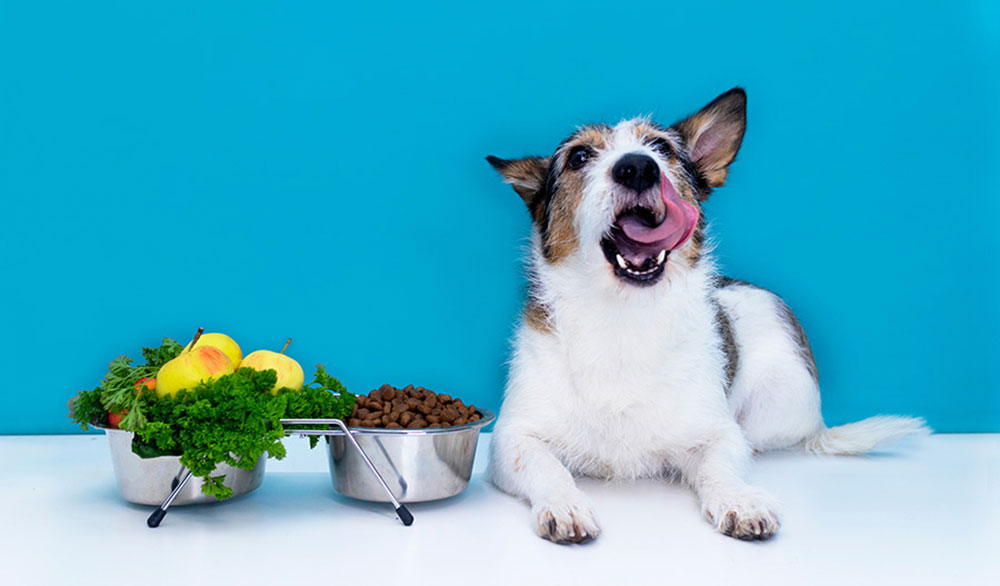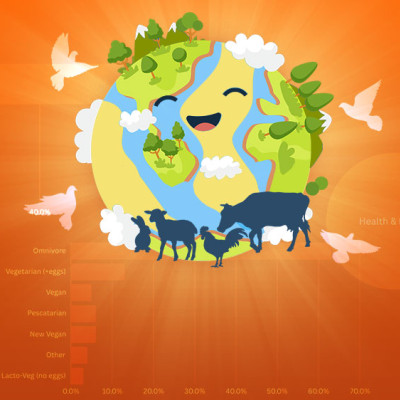Vegan dogs can be healthy on carefully formulated diets, says study
Published 5 April 2023
Vegan dogs are becoming increasingly common as more and more people ditch meat and dairy from their own and their companion animals' diets.

Vegan dogs can be healthy if they consume a well formulated diet, according to a new study published in the Journal of Animal Science.
Researchers from the University of Illinois say their findings show how ‘at least two human-grade, lightly cooked vegan diets provide adequate nutrition for dogs’.
They tested the two formulas (with and without a grain ingredient) from Bramble against a leading brand chicken-based kibble diet.
The team analysed the foods, confirming that they met standards set by the Association of American Feed Control Officials (AAFCO) for “complete and balanced” nutrition.
After beagles consumed the diet for three weeks, researchers analysed their blood chemistry, faecal quality, and microbiome (collection of microbes present in their faeces).
Vegan dogs
Study co-author Kelly Swanson, professor in the Department of Animal Sciences at U of I, said: “The trends of plant-based foods and human grade foods are increasing for dogs.
“Because people are feeding these diets to their pets, it’s important they be tested like all other foods to make sure they’re safe and ‘complete and balanced.”
He added: “One thing to remember is that animals don’t have ingredient requirements, they have nutrient requirements. As long as they’re consuming the essential nutrients in the correct amounts and ratios, dogs can be vegan, vegetarian, or meat-eater.
“Knowledge of ingredient composition and nutrient needs are critical, however.
“Anyone can slap together a vegan meal for their dog, but without careful formulation, you might have something that’s really imbalanced.”

‘Highly digestible’
The latest study follows earlier research undertaken by Swanson’s group, which showed human-grade, fresh dog foods to be highly digestible, resulting in dramatically less stool.
According to researchers, that was not the case for the vegan diets in the current study. They noted that while all the diets were highly digestible, the vegan diets ‘didn’t generate any more or less stool than the chicken diet’.
Swanson said: “It’s not a surprise, really. With these ingredients, there’s more fiber and oligosaccharides, which could be good for dogs that need to stay regular.”
One difference researchers noted between the vegan and meat diets were that that ‘certain blood metabolites – chemicals in the blood that can indicate health status – differed between the vegan diets and the chicken-based diet’.
Notably, they found that blood triglycerides and cholesterol, measures of circulating fats, were ‘significantly lower in dogs fed the vegan diets’, which could help obese pets acquire and maintain a healthy weight, according to Swanson.
Gut health
Meanwhile, the faecal microbiome analysis yielded positive results.
“There were some interesting and beneficial changes in the microbial community that I think reflect the blend of fibres that were present in the vegan diets,” said Swanson.
“The fecal metabolites phenol and indole, both of which contribute to fecal odor, were dramatically decreased in those diets too. It’s still going to smell, but probably less.
“Overall, it looked like there were some beneficial shifts from a gut health perspective in dogs fed the vegan diets.”
Original article > by Maria Chiorando, Vegan Food & Living
Recent News
-

Navigating plant-based protein sources
"But where do you get your protein from?", the most common question asked of all vegans. Here is an introduction to some of the best and easiest plant-based protein sources.
-

Dogs Thrive on Vegan Diets, Demonstrates the Most Comprehensive Study So Far
The longest, most comprehensive peer-reviewed study so far has demonstrated that dogs fed nutritionally-sound vegan diets maintain health outcomes as well as dogs fed meat.
-

Vegan YouTube Channels – Our Top Picks
Vegan Easy’s YouTube channel recommendations to help you on your vegan journey.
-

Pamela Anderson’s New Vegan Cookbook: A Culinary Journey of Love and Compassion
Pamela Anderson, the iconic Hollywood actress and passionate animal rights advocate, is set to captivate the culinary world with her upcoming vegan cookbook titled "I Love You: Recipes from the Heart."
-

January 2024 Vegan Easy Challenge Recap
People from around the world began their 2024 with a peaceful start by taking the 30-day Vegan Easy Challenge.
-

Discover the Culinary Delights of Byron Bay’s Newest Plant-Based Cooking School
Learn the sublime art of plant-based cuisine at Katie White's new cooking school in Byron Bay
Leave a Comment